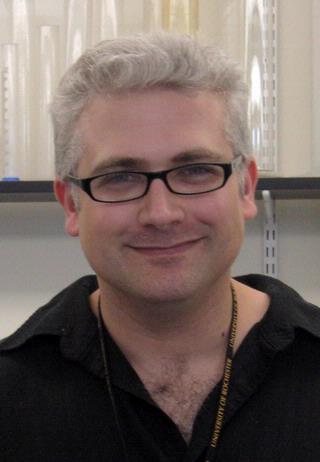
Ethan David Cohen, Ph.D.
Contact
About Me
Professional Background
Faculty Appointments
Research Assistant Professor - Department of Pediatrics, Neonatology (SMD)
Credentials
Education
Ph.D. | University of Pennsylvania, School of Medicine. Biomedical Graduate Studies. 2004
PhD | Univ Pennsylvania Sch Medicine. Cell and Molecular Biology. 2004
BS | Lebanon Valley College. Biochemistry. 1997
Awards
American Heart Association Grant-in-Aid Award. 2015 - 2107
Holtzer Prize for outstanding postdoctoral research in cell and developmental biology at the University of Pennsylvania. 2008
The Susan Heyner Award for Excellence in Research. 2002
Research
Publications
Journal Articles
Burris J, Beutner G, Cohen ED, Yee M, O'Reilly MA, Porter GA
Biophysical journal.. 2023 February 10122 (3S1):96a. Epub 1900 01 01.
Quijada P, Trembley MA, Misra A, Myers JA, Baker CD, Pérez-Hernández M, Myers JR, Dirkx RA, Cohen ED, Delmar M, Ashton JM, Small EM
Nature communications.. 2021 July 612 (1):4155. Epub 07/06/2021.
Cohen ED, Yee M, Porter GA, Ritzer EE, McDavid AN, Brookes PS, Pryhuber GS, O'Reilly MA
JCI insight.. 2021 January 28 Epub 01/28/2021.
Yee M, Cohen ED, Haak J, Dylag AM, O'Reilly MA
bioRxiv : the preprint server for biology.. 2020 July 22 Epub 07/22/2020.
Yee M, Cohen ED, Domm W, Porter GA, McDavid AN, O'Reilly MA
American journal of physiology. Lung cellular and molecular physiology.. 2018 May 1314 (5):L846-L859. Epub 01/18/2018.
Ajima R, Bisson JA, Jay-Christian Helt , Nakaya MA, Habas R, Tessarollo L, He X, Morrisey EE, Yamaguchi TP, Cohen ED
Developmental biology.. 2015 December 1408 (1):126-39. Epub 10/23/2015.
Bisson JA, Mills B, Paul Helt JC, Zwaka TP, Cohen ED
Developmental biology.. 2015 February 1398 (1):80-96. Epub 12/05/2014.
Kadzik RS, Cohen ED, Morley MP, Stewart KM, Lu MM, Morrisey EE
Proceedings of the National Academy of Sciences of the United States of America.. 2014 August 26111 (34):12444-9. Epub 08/11/2014.
Miller MF, Cohen ED, Baggs JE, Hogenesch JB, Morrisey EE
PloS one.. 2013 8 (1):e55782. Epub 01/31/2013.
Miller MF, Cohen ED, Baggs JE, Lu MM, Hogenesch JB, Morrisey EE
Proceedings of the National Academy of Sciences of the United States of America.. 2012 September 18109 (38):15348-53. Epub 09/04/2012.
Cohen ED, Miller MF, Wang Z, Moon RT, Morrisey EE
Development.. 2012 June 139 (11):1931-40. Epub 1900 01 01.
Shen D, Li J, Lepore JJ, Anderson TJ, Sinha S, Lin AY, Cheng L, Cohen ED, Roberts JD, Dedhar S, Parmacek MS, Gerszten RE
Circulation research.. 2011 September 2109 (6):616-28. Epub 07/21/2011.
Goss AM, Tian Y, Cheng L, Yang J, Zhou D, Cohen ED, Morrisey EE
Developmental biology.. 2011 August 15356 (2):541-52. Epub 06/16/2011.
Yuan L, Wang T, Liu F, Cohen ED, Patel VV
Journal of the American Society of Echocardiography : official publication of the American Society of Echocardiography.. 2010 August 23 (8):887-97. Epub 06/29/2010.
Tian Y, Cohen ED, Morrisey EE
Pediatric cardiology.. 2010 April 31 (3):342-8. Epub 12/05/2009.
Tian Y, Yuan L, Goss AM, Wang T, Yang J, Lepore JJ, Zhou D, Schwartz RJ, Patel V, Cohen ED, Morrisey EE
Developmental cell.. 2010 February 1618 (2):275-87. Epub 1900 01 01.
Cohen ED, Ihida-Stansbury K, Lu MM, Panettieri RA, Jones PL, Morrisey EE
The Journal of clinical investigation.. 2009 September 119 (9):2538-49. Epub 08/17/2009.
Goss AM, Tian Y, Tsukiyama T, Cohen ED, Zhou D, Lu MM, Yamaguchi TP, Morrisey EE
Developmental cell.. 2009 August 17 (2):290-8. Epub 1900 01 01.
Zhang Y, Goss AM, Cohen ED, Kadzik R, Lepore JJ, Muthukumaraswamy K, Yang J, DeMayo FJ, Whitsett JA, Parmacek MS, Morrisey EE
Nature genetics.. 2008 July 40 (7):862-70. Epub 06/08/2008.
Cohen ED, Morrisey EE
Genes & development.. 2008 March 1522 (6):706-10. Epub 1900 01 01.
Cohen ED, Tian Y, Morrisey EE
Development.. 2008 March 135 (5):789-98. Epub 1900 01 01.
Cohen ED, Wang Z, Lepore JJ, Lu MM, Taketo MM, Epstein DJ, Morrisey EE
The Journal of clinical investigation.. 2007 July 117 (7):1794-804. Epub 1900 01 01.
Cohen ED, Mariol MC, Wallace RM, Weyers J, Kamberov YG, Pradel J, Wilder EL
Developmental cell.. 2002 April 2 (4):437-48. Epub 1900 01 01.
Janson K, Cohen ED, Wilder EL
Mechanisms of development.. 2001 May 103 (1-2):117-20. Epub 1900 01 01.